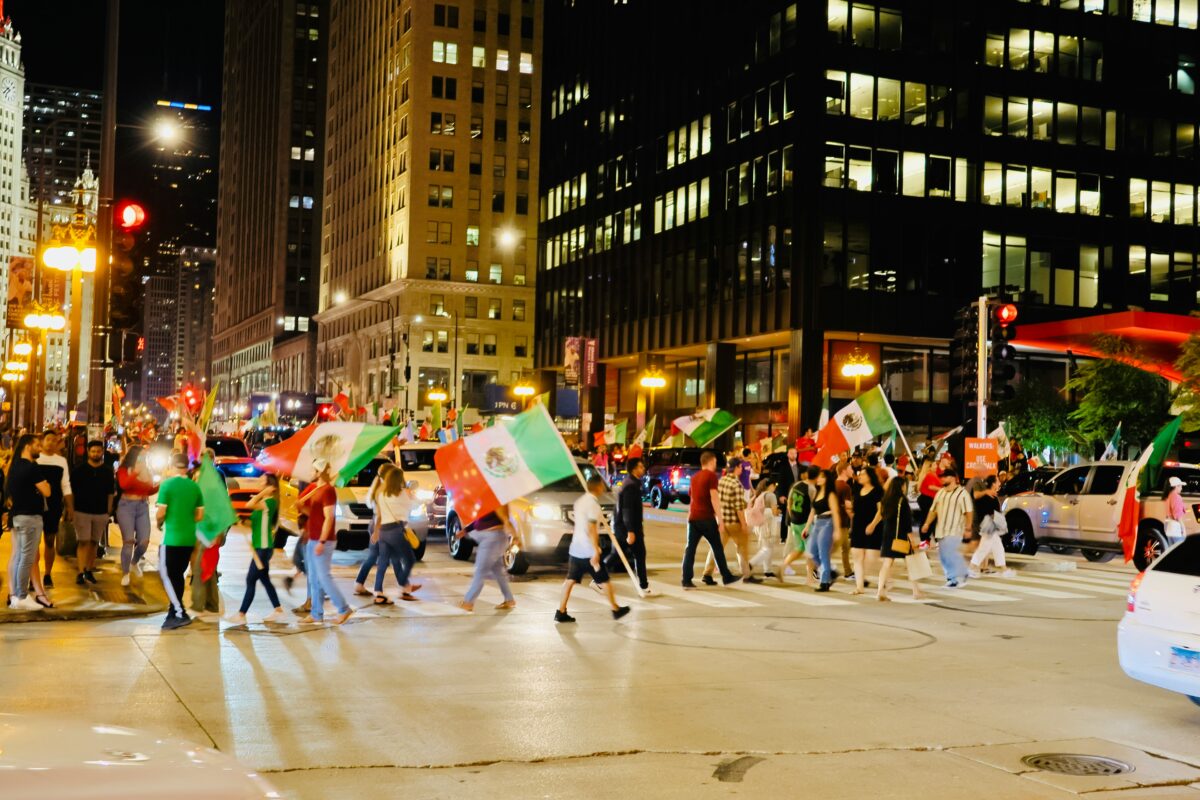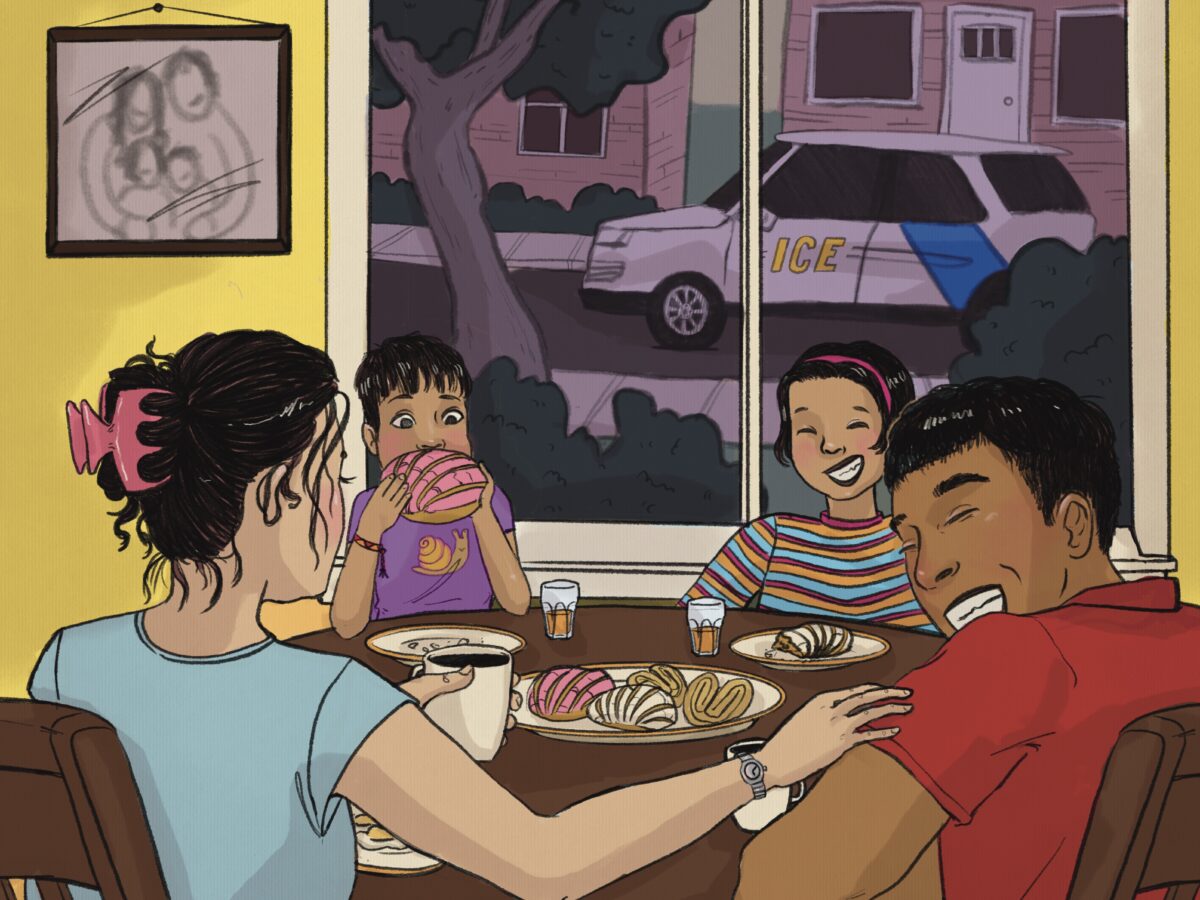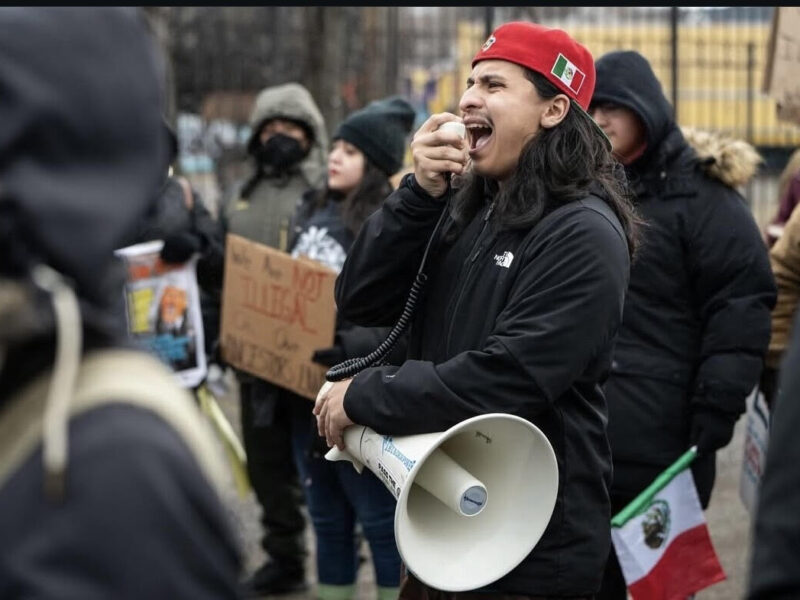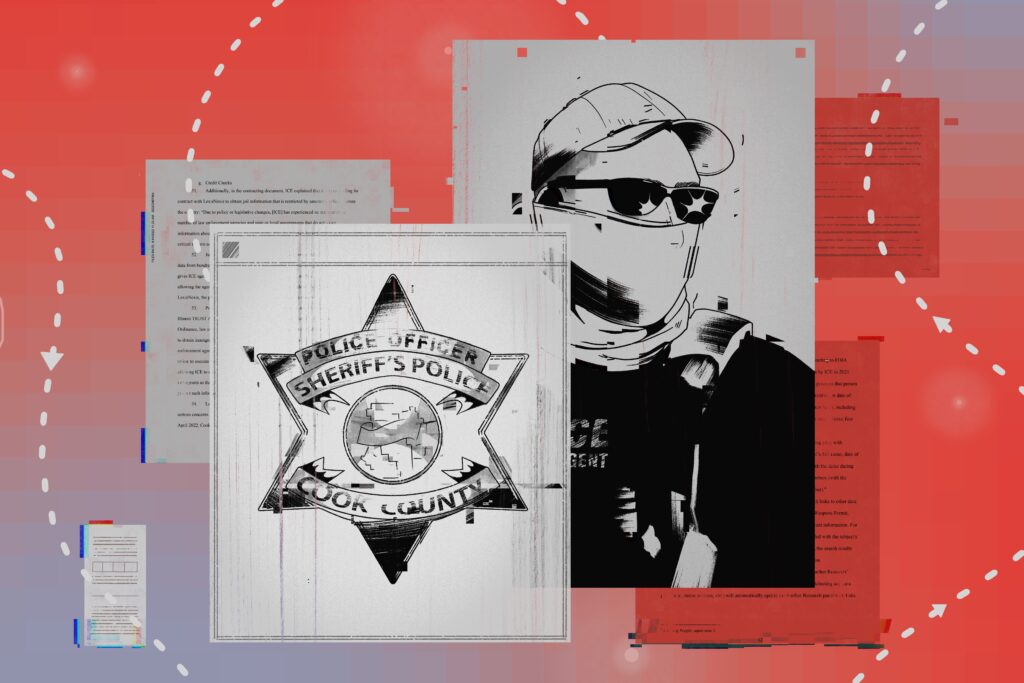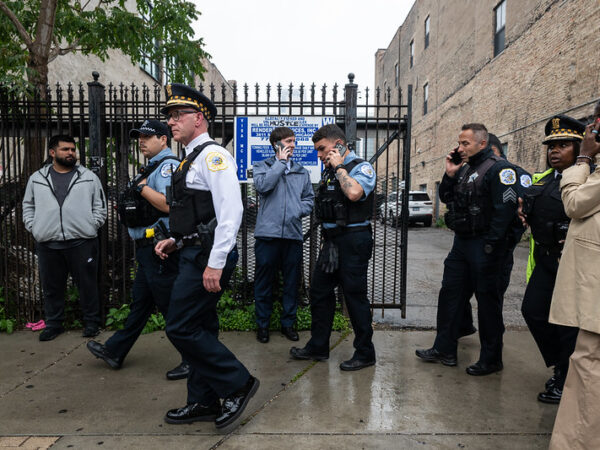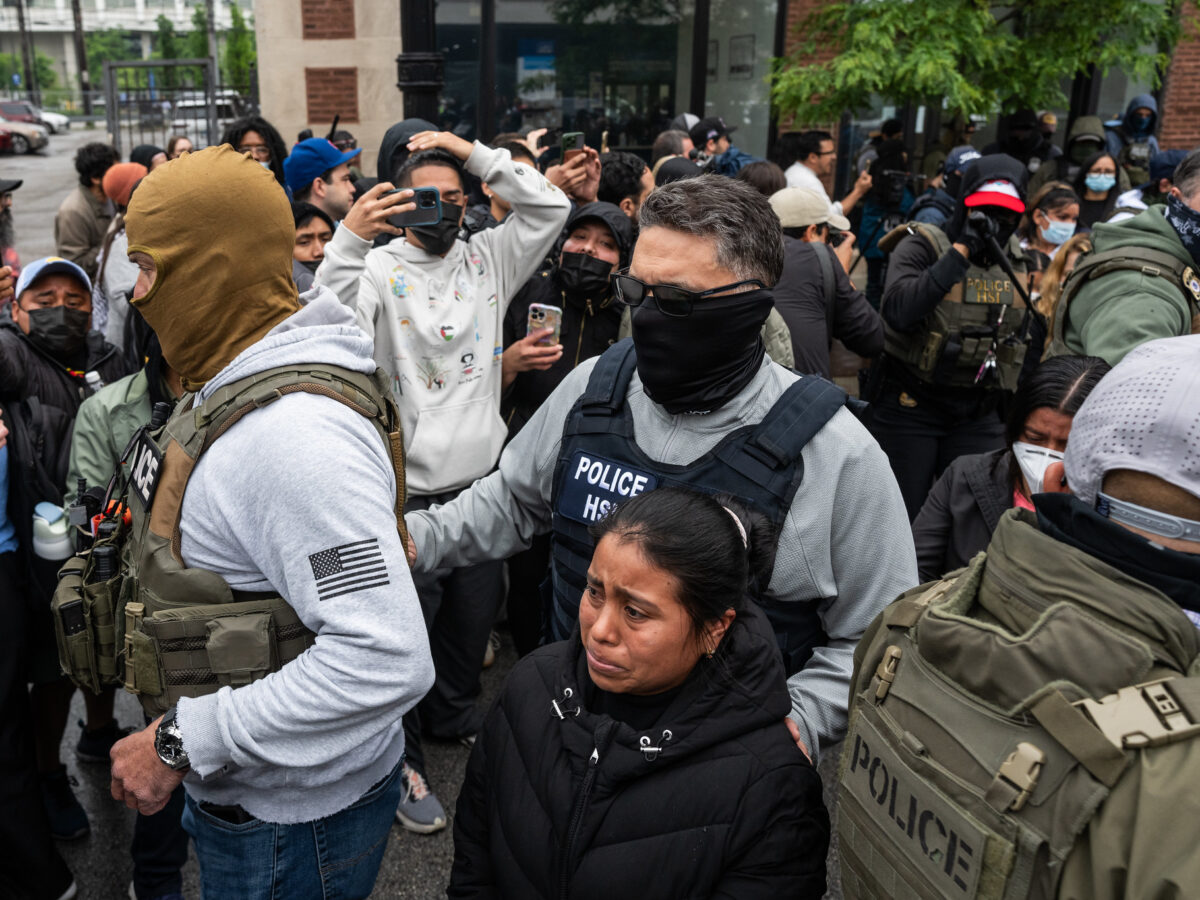On Tuesday, President Donald Trump escalated his threats against Chicago, declaring “we’re going in” and signaling plans to deploy immigration agents and National Guard troops to the city. Yesterday, a leaked Department of Homeland Security memo showed that active-duty soldiers have already arrived in Illinois and are staging out of the Naval Station Great Lakes in North Chicago, IL. Federal agencies are also reportedly preparing operations that may impact Mexican Independence Day events as well as everyday life on the South Side and throughout Chicagoland.
At a press conference on Tuesday, Governor J.B. Pritzker revealed that the federal immigration surge in Chicago is planned as a thirty-day operation set to begin Friday. During the press conference, Pritzker warned that Immigration and Customs Enforcement (ICE) officers could target community gatherings during Mexican Independence Day events. He said the alert originated from Gregory Bovino, chief of the Border Patrol’s El Centro sector, who contacted the Illinois State Police.
“It breaks my heart to report that we have been told ICE will try to disrupt community picnics and peaceful gatherings,” Pritzker said, noting that parades and neighborhood festivals are meant to showcase culture and pride, not serve as flashpoints for federal enforcement. No planned community events have been cancelled yet.
Trump initially threatened to send the National Guard, but in recent days the focus has shifted toward deploying immigration agents instead. On Tuesday, a federal judge in California ruled that Trump’s deployment of Marines and National Guard to Los Angeles in June violated the Posse Comitatus Act, a federal law barring the use the military for domestic law enforcement.
The president’s portrayal of Chicago as overrun with violence stands in sharp contrast to the data. Shootings and homicides are down significantly from last year, and the city has seen its fewest summer murders since 1965, with homicides down about 30 percent and overall violent crime down more than 20 percent compared to 2024.
Pritzker and Chicago Mayor Brandon Johnson rejected the idea of sending troops to Chicago. The mayor called the deployment unnecessary and “unconstitutional,” and signed an executive order prohibiting City departments from cooperating with any federal or National Guard units in civil immigration enforcement and reaffirming the Welcoming City Ordinance.
In his official statement, Pritzker accused Trump of “attempting to manufacture a crisis … politicize Americans who serve in uniform, and continue abusing his power to distract from the pain he is causing working families.”
The American Civil Liberties Union of Illinois condemned Trump’s threats in a statement.
“President Trump’s continued threats to send National Guard and federal troops to Chicago reflect his worst authoritarian instincts. To be clear there is no emergency in Chicago to justify the introduction of any military troops. And this step will only make people across our city and the area feel less safe and less secure,” the statement read. “The ACLU of Illinois is committed to protecting fundamental rights and liberties in Chicago and across our state. Where we see violations of basic rights, we will act and demand that Trump and his federal forces are held accountable for these violations.”
Meanwhile, officials confirmed that ICE, U.S. Customs and Border Protection (CBP), and other federal agencies are expanding enforcement operations in Chicago and using the Naval Station Great Lakes as a staging ground. The base has been requested to provide infrastructure and logistical support through September, according to the Washington Post.
The threat of renewed immigration enforcement has sparked unease in immigrant neighborhoods where the idea of troops near schools brings back old fears. In January, rumors of ICE activity near several CPS campuses prompted parents to keep children home.
Chicago Public Schools (CPS) acknowledged those fears directly in a letter to families and staff.
“We know that the potential of increased federal presence is creating anxiety and fear about safety at school, and safety within the broader community,” Interim CPS CEO Macquline King wrote. The letter said that schools remain “the best and safest place for children,” and reiterated that as policy, the district does not ask families about immigration status, does not share student records with ICE, and does not permit federal agents into schools without a warrant signed by a judge.
CPS also urged families to use community safety strategies such as walking school groups and neighborhood phone trees, and pointed them to Know Your Rights resources on cps.edu/immigration.
In response to the threat, Chicagoans are organizing.
Nubia Willman, the chief programs officer at Latinos Progresando, a Little Village-based nonprofit that provides affordable immigration legal services and advocates for immigrant rights, said communities are not safe when families are worried about being separated on their way to work or school.
“For us, the idea of safety does not include terrorizing the community which is essentially what these actions [National Guard deployment] are doing,” Willman said.
22nd Ward Ald. Michael Rodriguez said he is concerned that federal deployment of military personnel will erode public trust with local policing institutions during a time in which Chicago is experiencing a drop in violent crime and homicides.
Rodriguez and Ald. Jeylú Gutiérrez, whose 14th Ward includes parts of Gage Park, Chicago Lawn, Archer Heights, and West Elsdon, submitted a resolution insisting the Chicago Police Department (CPD) not participate in “any unlawful or unconstitutional policing” by the military.
According to Rodriguez, the resolution is meant to reaffirm that CPD should not participate in joint controls, arrests, or operations alongside the National Guard or other military personnel, especially if such operations are aimed at separating families because of their immigration status.
“I think the city, the county, the state all agree that this federal incursion is one, unwelcome; two, un‑American; and three, counterproductive to public safety,” he said.
In Pilsen, the 25th Ward Independent Political Organization (IPO) and Pilsen Unidos por Nuestro Orgullo (PUÑO) have been organizing Know Your Rights workshops and “migra watch,” a community-led rapid response program that monitors ICE raids and deportations, this weekend.
When ICE is spotted or suspected to be in the community, PUÑO migra watch and rapid response teams are notified to verify ICE sightings and provide follow-up support to community members who may have had a loved one detained.
Over several months, hundreds of community members have been trained as volunteers in Pilsen. They are part of a larger rapid response network organized and supported by Organized Communities Against Deportations (OCAD) and the Illinois Coalition for Immigrant and Refugee Rights (ICIRR).
According to Mimi Guiracocha, who is active in the 25th Ward IPO and PUÑO, educating neighbors about their constitutional rights and empowering them to exercise those rights contributes to safer communities.
“I think people do not feel safe because of what the federal government is doing, not because of crime,” Guiracocha said.
A local piñata vendor, Biri, said she thinks the National Guard is unnecessary. Biri, who has lived in Pilsen for three years, added that she expects people will be less likely to come out of their homes due to fear, and is worried her business will suffer.
Guiracocha and PUÑO members have plans in place as the city braces for the possible deployment of the National Guard, including a Migra Watch training on Sunday, September 7. She questioned the legality of Trump’s actions, calling a deployment of troops a waste of money that will not make Chicago safer.
“Chicago won’t back down. Chicago never has and Chicago never will. We are here and we are going to keep us safe and we are going to defend our communities,” Guiracocha said.
related story
In Back of the Yards, some residents wondered if the annual Hispanic Heritage Month celebration this Friday will be canceled. Craig Chico, the executive director of the Back of the Yards Neighborhood Council (BYNC), said it’s still on. On Thursday, organizers of the city’s relatively new, downtown El Grito celebration announced it would be cancelled. In a statement, El Grito organizers said holding the event would put community safety at stake and that it’s a risk they’re unwilling to take.
According to Chico, the heightened sense of fear in the community has caused attendance for BYNC’s outdoor programming to drop. While businesses and restaurants along the commercial corridors on 47th and Ashland have seen sales drop by as much as fifty percent.
The decision to proceed with this week’s celebration weighs heavily on Chico, who said the last thing he wants to do is put the community in harm’s way. Last year, he said he witnessed a mom pick her daughter up and run, trying to exit a local festival after the community, on high alert, believed ICE was present during a chaotic scene that turned out to be a fight between some youths.
“That is a lasting, lifelong memory that kid is probably going to have. That poor little girl running away, fearful of the fact that her mom might be taken away,” Chico said.
In Little Village, preparations for the 54th annual 26th Street Mexican Independence Day Parade continue undeterred. The mood is complicated: anxiety lingers, but so does pride.
“We will not back down. We are going to celebrate our culture, our history,” Rodriguez said.
In Back of the Yards, Chico echoed that resilience. “One of the ways to battle back is to not stop living,” he said.
Editor’s note: This story was updated on Thursday, September 4, after El Grito organizers announced the event would be cancelled this year.
José Abonce is the senior program manager for the Chicago Neighborhood Policing Initiative and a freelance reporter who focuses on immigration, public safety, politics, and race. Alma Campos is the Weekly’s immigration reporter and project editor.

